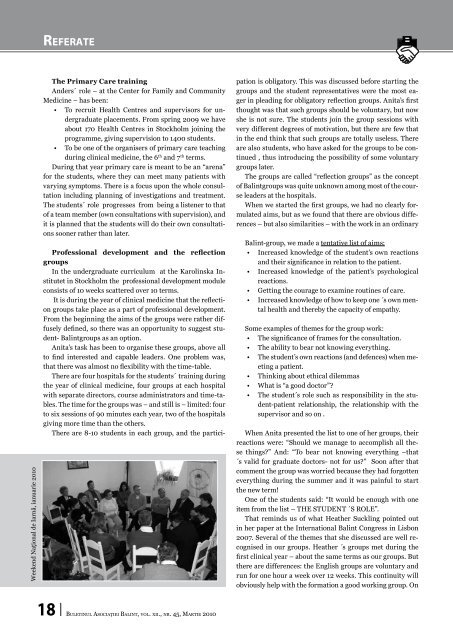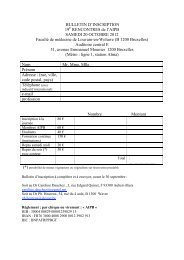Marie 2010
martie 2010 - Psychodrame Balint
martie 2010 - Psychodrame Balint
Create successful ePaper yourself
Turn your PDF publications into a flip-book with our unique Google optimized e-Paper software.
ReferateWeekend Naţional de Iarnă, ianuarie <strong>2010</strong>The Primary Care trainingAnders´ role – at the Center for Family and CommunityMedicine – has been:• To recruit Health Centres and supervisors for undergraduateplacements. From spring 2009 we haveabout 170 Health Centres in Stockholm joining theprogramme, giving supervision to 1400 students.• To be one of the organisers of primary care teachingduring clinical medicine, the 6 th and 7 th terms.During that year primary care is meant to be an “arena”for the students, where they can meet many patients withvarying symptoms. There is a focus upon the whole consultationincluding planning of investigations and treatment.The students´ role progresses from being a listener to thatof a team member (own consultations with supervision), andit is planned that the students will do their own consultationssooner rather than later.18Buletinul Asociaţiei Balint, vol. xii., nr. 45, Martie <strong>2010</strong>Professional development and the reflectiongroupsIn the undergraduate curriculum at the Karolinska Institutetin Stockholm the professional development moduleconsists of 10 weeks scattered over 10 terms.It is during the year of clinical medicine that the reflectiongroups take place as a part of professional development.From the beginning the aims of the groups were rather diffuselydefined, so there was an opportunity to suggest student-Balintgroups as an option.Anita’s task has been to organise these groups, above allto find interested and capable leaders. One problem was,that there was almost no flexibility with the time-table.There are four hospitals for the students´ training duringthe year of clinical medicine, four groups at each hospitalwith separate directors, course administrators and time-tables.The time for the groups was – and still is – limited: fourto six sessions of 90 minutes each year, two of the hospitalsgiving more time than the others.There are 8-10 students in each group, and the participationis obligatory. This was discussed before starting thegroups and the student representatives were the most eagerin pleading for obligatory reflection groups. Anita’s firstthought was that such groups should be voluntary, but nowshe is not sure. The students join the group sessions withvery different degrees of motivation, but there are few thatin the end think that such groups are totally useless. Thereare also students, who have asked for the groups to be continued, thus introducing the possibility of some voluntarygroups later.The groups are called “reflection groups” as the conceptof Balintgroups was quite unknown among most of the courseleaders at the hospitals.When we started the first groups, we had no clearly formulatedaims, but as we found that there are obvious differences– but also similarities – with the work in an ordinaryBalint-group, we made a tentative list of aims:• Increased knowledge of the student’s own reactionsand their significance in relation to the patient.• Increased knowledge of the patient’s psychologicalreactions.• Getting the courage to examine routines of care.• Increased knowledge of how to keep one ´s own mentalhealth and thereby the capacity of empathy.Some examples of themes for the group work:• The significance of frames for the consultation.• The ability to bear not knowing everything.• The student’s own reactions (and defences) when meetinga patient.• Thinking about ethical dilemmas• What is “a good doctor”?• The student´s role such as responsibility in the student-patientrelationship, the relationship with thesupervisor and so on .When Anita presented the list to one of her groups, theirreactions were: “Should we manage to accomplish all thesethings?” And: “To bear not knowing everything –that´s valid for graduate doctors- not for us?” Soon after thatcomment the group was worried because they had forgotteneverything during the summer and it was painful to startthe new term!One of the students said: “It would be enough with oneitem from the list – THE STUDENT ´S ROLE”.That reminds us of what Heather Suckling pointed outin her paper at the International Balint Congress in Lisbon2007. Several of the themes that she discussed are well recognisedin our groups. Heather ´s groups met during thefirst clinical year – about the same terms as our groups. Butthere are differences: the English groups are voluntary andrun for one hour a week over 12 weeks. This continuity willobviously help with the formation a good working group. On



